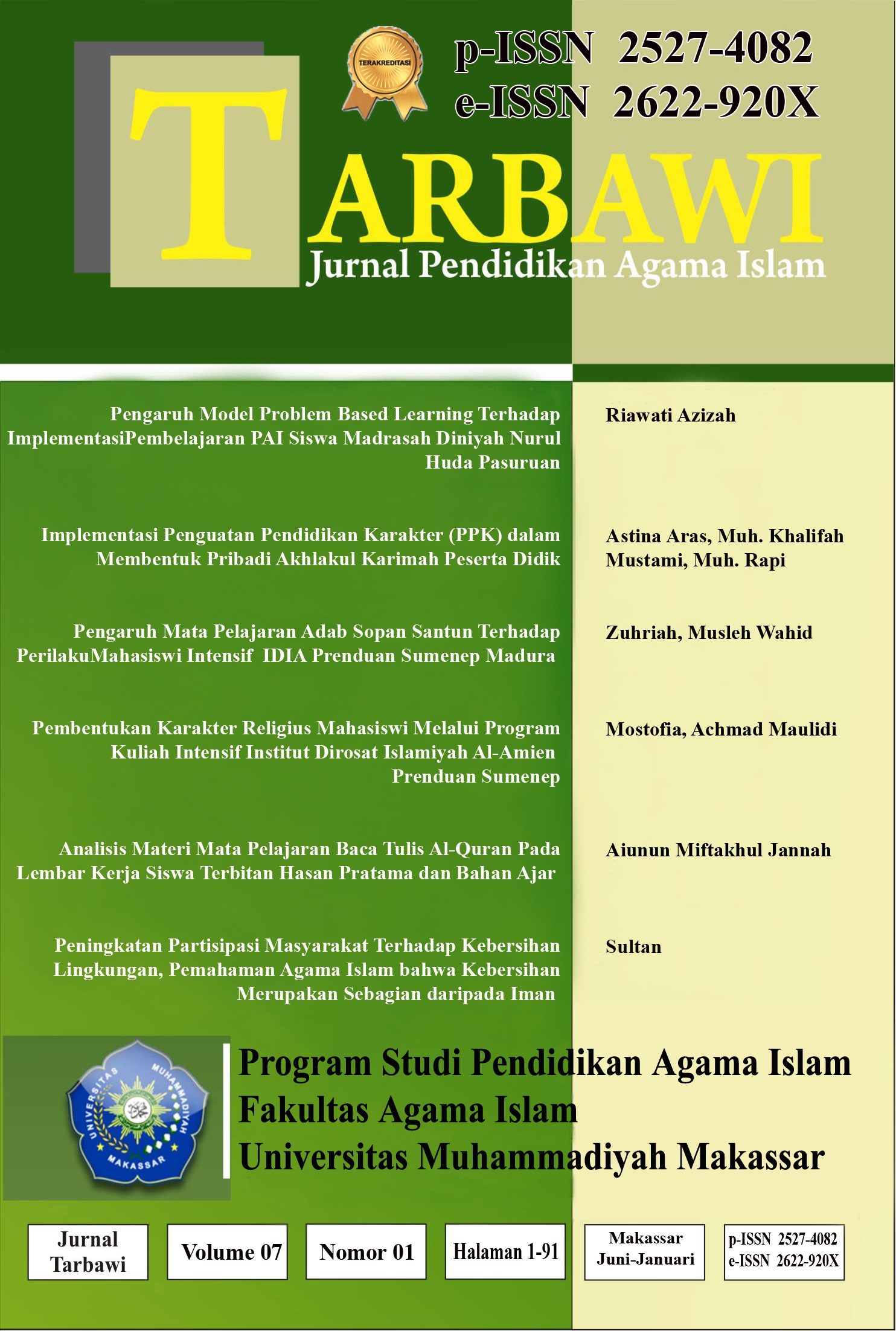Hidden Curriculum Dalam Pembinaan Akhlak Peserta Didik Menurut Imam Badruddin Ibn Jama'ah Dalam Tadzkiratussami'
DOI: https://doi.org/10.26618/jtw.v7i02.4912
Hidden Curriculum, guiding the attitudes, Tadzkiratussami'
Abstract
This research is aimed at studying a book of Imam Badruddin Ibnu Jama’ah in guiding the attitudes through Hidden Curriculum. Conceptually the curriculum consists of four dimensions including idea development, written curriculum (curriculum design), curriculum implementation, and curriculum result. Hidden curriculum basically exists in every education process, but it’s not shown in a concept and its own dimension.
Ibnu Jama’ah detailed successful keys of an educator. In relation to teacher/educator concept and its relationship with education, Ibnu Jama’ah detailed its related Islamic norms, which becomes one of the keys of successful students, and shows an example for the students, which include: Norms between educator and him/herself, norms between educator and his/her students, and norms between educator and his/her study.
Process of moral education implementation toward children through education, habituation and good example will help increasing the character education of the students. So that embedding character education to the students sustainably will make the students have good character and can be implemented in daily life.
By implementing education norms in the Tadzkirat al-Sâmi’ wa alMutakallim fî Adab al-’Âlim wa al-Muta’allim book which includes ang Hidden Curriculum through the process of guidance which consists of understanding, habituation, and good example of the teacher or educator can create good students.
References
At-Tuwaijiri, Syaikh Muhammad bin Ibrahim bin Abdullah. Suharlan dan Makmum, A. Jakarta. Darus Sunnah Press. Terjemahan dari Fiqhul Qulub
Chang, R. dan Overby, J. (2014). General Chemistry The Essential Concepts 6th Edition. New York: The Mc Graw Hill Companies
Firdaus, Rizal. 2016. Pemikiran Pendidikan Ibnu Jama’ah (w. 773 H) (Tela’ah atas Kitab Tadzkirat al-Sâmi’ wa al-Mutakallim fî Adab al-’Âlim wa al-Muta’allim). Râyah al-Islâm: Jurnal Ilmu Islam – Volume: 1 (1) : 34-51
Goleman, D, 2000, Kecerdasan Emosi : Mengapa Emotional Intelligence Lebih Tinggi Dari pada IQ, Jakarta: PT. Gramedia PustakaUtama,
Ibnu Jama’ah, Badruddin. 1433 H. Tadzkirat al-Sâmi’ wa al-Mutakallim fî Adab al-‘Âlim wa al-Muta’allim. Ed: Muhammad bin Mahdi al- ’Ajmi. Cet. III. Beirut: Dâr al-Basyâ’ir al-Islâmiyyah.
Inayatullah. 2011. Kontribusi Faktor-Faktor Internal Dan Eksternal Terhadap Eningkatan Kinerja Profesional Guru. edukasi, Vol. 3(1) :51 – 74
Khodijah, S dan Nurizzati, Y . 2018 . Dampak Penggunaan Teknologi Informasi Dan Komunikasi Terhadap Perilaku Sosial Siswa Di Man 2 Kuningan. Jurnal Edueksos Volume VII No 2 : 161-178
Muhdar, HM. 2013. Pendidikan Karakter Menuju Sdm Paripurna. Jurnal Al-Ulum (Jurnal Studi-Studi Islam) IAIN Gorontalo Vol 13 (1) : 103-128
Nasirudin, M. 2010. Pendidikan Tasawuf. Semarang: RaSAIL Group
Ratnaya, I G. 2011. Dampak Negatif Perkembangan Teknologi Informatika Dan Komunikasi Dan Cara Antisifasinya. Jptk, Undiksha, Vol. 8, (1) : 17 – 28
Sabda, Syaifuddin. 2016. Pengembangan Kurikulum (Tinjauan Teoritis). Sleman. Aswaja Pressindo
Saliman. 2015. Bentuk-Bentuk Kenakalan Siswa Smp Di Kota Yogyakarta. JIPSINDO No. 2, (2): 179-201
Sholiha, M dkk. 2017. Pengaruh Kecerdasan Emosional Dan Kecerdasan Spiritual Terhadap Kinerja Guru Smp An-Nur Bululawang – Malang. Warta Ekonomi VOL. 07 (17) : 78-92
Sukardi, Metodologi Penelitian Pendidikan; Kompetisi dan Prakteknya, PT. Bumi Aksara, Jakarta, 2007
Yusra, Nelly. 2016. Implementasi Pendidikan Akhlak Di Sekolah Dasar Islam Terpadu (Sdit) Al-Badr Kecamatan Bangkinang Kabupaten Kampar. Potensia: Jurnal Kependidikan Islam, Vol. 2 (1) : 45-70
Zamroni, amin. 2017. Strategi Pendidikan Akhlak Pada Anak. SAWWA – Volume 12 (2) : 241-264
Zohar, D. Marshall, I. 2007. SQ: Kecerdasan Spiritual. Bandung: Mizan.
Downloads
Published
Issue
Section
License
Dalam hal artikel diterima oleh Tim Editorial TARBAWI: Jurnal Pendidikan Agama Islam, dengan nomor terdaftar ISSN 2527-4082 (Cetak), ISSN 2622-920X (Online) dan ada keputusan untuk menerbitkan artikel, hak cipta dari artikel dipegang oleh penulis.
Prodi Pendidikan Agama Islam, Fakultas Agama Islam, Universitas Muhammadiyah Makassar sebagai penerbit TARBAWI: Jurnal Pendidikan Agama Islam memegang hak publikasi semua artikel yang diterbitkan dalam jurnal ini.
Prodi Pendidikan Agama Islam, Fakultas Agama Islam, Universitas Muhammadiyah Makassar sebagai penerbit TARBAWI: Jurnal Pendidikan Agama Islam, dengan nomor terdaftar ISSN 2527-4082 (Cetak), ISSN 2622-920X (Online) memiliki hak untuk mereproduksi dan mendistribusikan artikel dan penulis tidak diizinkan untuk menerbitkan artikel yang sama yang diterbitkan dalam jurnal ini.
Pernyataan Keaslian dan Naskah Hak Cipta dapat diunduh: di sini
Setelah mengisi surat pernyataan, silakan kirim via email: jurnaltarbawipai@gmail.com


















